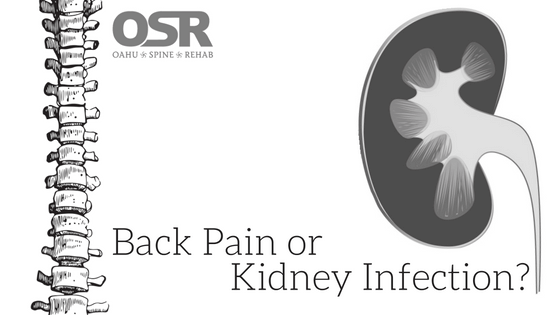Where Is Back Pain With Kidney Infection - Back pain is a common complaint among adults, and it can have many different causes. One potential cause of back pain is a kidney infection. However, it can be difficult to distinguish between kidney pain and lower back pain caused by other issues. In this post, we will explore how to tell the difference between kidney pain and lower back pain, as well as discuss the symptoms and treatment options for kidney infections.
Symptoms of Kidney Infections
 If you have a kidney infection, you may experience a variety of symptoms in addition to back pain. Some of these symptoms include:
If you have a kidney infection, you may experience a variety of symptoms in addition to back pain. Some of these symptoms include:
- Fever
- Nausea and vomiting
- Frequent urination that is painful or burning
- Blood in your urine
- Cloudy or foul-smelling urine
If you experience any of these symptoms, it is important to see a healthcare provider promptly. Kidney infections can be serious, and prompt treatment is necessary to prevent complications.
How to Tell the Difference Between Kidney Pain and Lower Back Pain
 Kidney pain and lower back pain can feel similar, which can make it difficult to tell the difference between them. However, there are a few key differences that can help you determine the cause of your back pain. Some things to consider include:
Kidney pain and lower back pain can feel similar, which can make it difficult to tell the difference between them. However, there are a few key differences that can help you determine the cause of your back pain. Some things to consider include:
Location of the pain
Kidney pain is typically felt in the back, just below the ribs. It may also spread to the groin and abdomen. Lower back pain, on the other hand, is usually felt in the lower back or hips.
Type of pain
Kidney pain is often described as a dull ache or pressure in the back. Lower back pain can be sharp or dull, and it may come and go or be constant.
Other symptoms
Kidney pain may be accompanied by other symptoms, such as fever, nausea, and vomiting. These symptoms are less common with lower back pain.
If you are unsure what is causing your back pain, it is important to see a healthcare provider. They can help determine the cause and recommend the appropriate treatment.
Treatment for Kidney Infections
 If you are diagnosed with a kidney infection, your healthcare provider will likely prescribe antibiotics to treat the infection. It is important to take the full course of antibiotics as prescribed, even if you start feeling better before you have finished the medication.
If you are diagnosed with a kidney infection, your healthcare provider will likely prescribe antibiotics to treat the infection. It is important to take the full course of antibiotics as prescribed, even if you start feeling better before you have finished the medication.
In addition to antibiotics, you may need to take pain medication and drink plenty of fluids to help flush the infection from your body. You should also avoid caffeine and alcohol, as these can irritate your kidneys.
If your symptoms do not improve with treatment, or if you experience severe pain or difficulty urinating, it is important to see your healthcare provider again. You may need additional testing or treatment.
Preventing Kidney Infections
 There are several things you can do to help prevent kidney infections. These include:
There are several things you can do to help prevent kidney infections. These include:
- Drink plenty of water to help flush bacteria out of your urinary tract.
- Wipe from front to back after using the bathroom to prevent bacteria from your bowel from spreading to your urinary tract.
- Urinate as soon as you feel the need to go, and don't hold it for long periods of time.
- Practice safe sex to reduce your risk of sexually transmitted infections (STIs) that can lead to kidney infections.
It is also important to maintain good hygiene and to see your healthcare provider for regular check-ups. If you have a history of kidney infections, your healthcare provider may recommend additional precautions or treatments to help prevent future infections.
Conclusion
 If you are experiencing back pain, it is important to determine the cause of the pain so that you can receive the appropriate treatment. Kidney infections can cause back pain, but they are often accompanied by other symptoms such as fever and nausea. If you believe you may have a kidney infection, it is important to see a healthcare provider promptly to prevent complications.
If you are experiencing back pain, it is important to determine the cause of the pain so that you can receive the appropriate treatment. Kidney infections can cause back pain, but they are often accompanied by other symptoms such as fever and nausea. If you believe you may have a kidney infection, it is important to see a healthcare provider promptly to prevent complications.
If you are unsure what is causing your back pain, or if your symptoms do not improve with treatment, it is important to see your healthcare provider for further evaluation. They can help determine the cause of your pain and recommend appropriate treatment options.
By taking steps to prevent kidney infections and maintaining good overall health, you can help reduce your risk of developing back pain and other conditions.
Find more articles about Where Is Back Pain With Kidney Infection